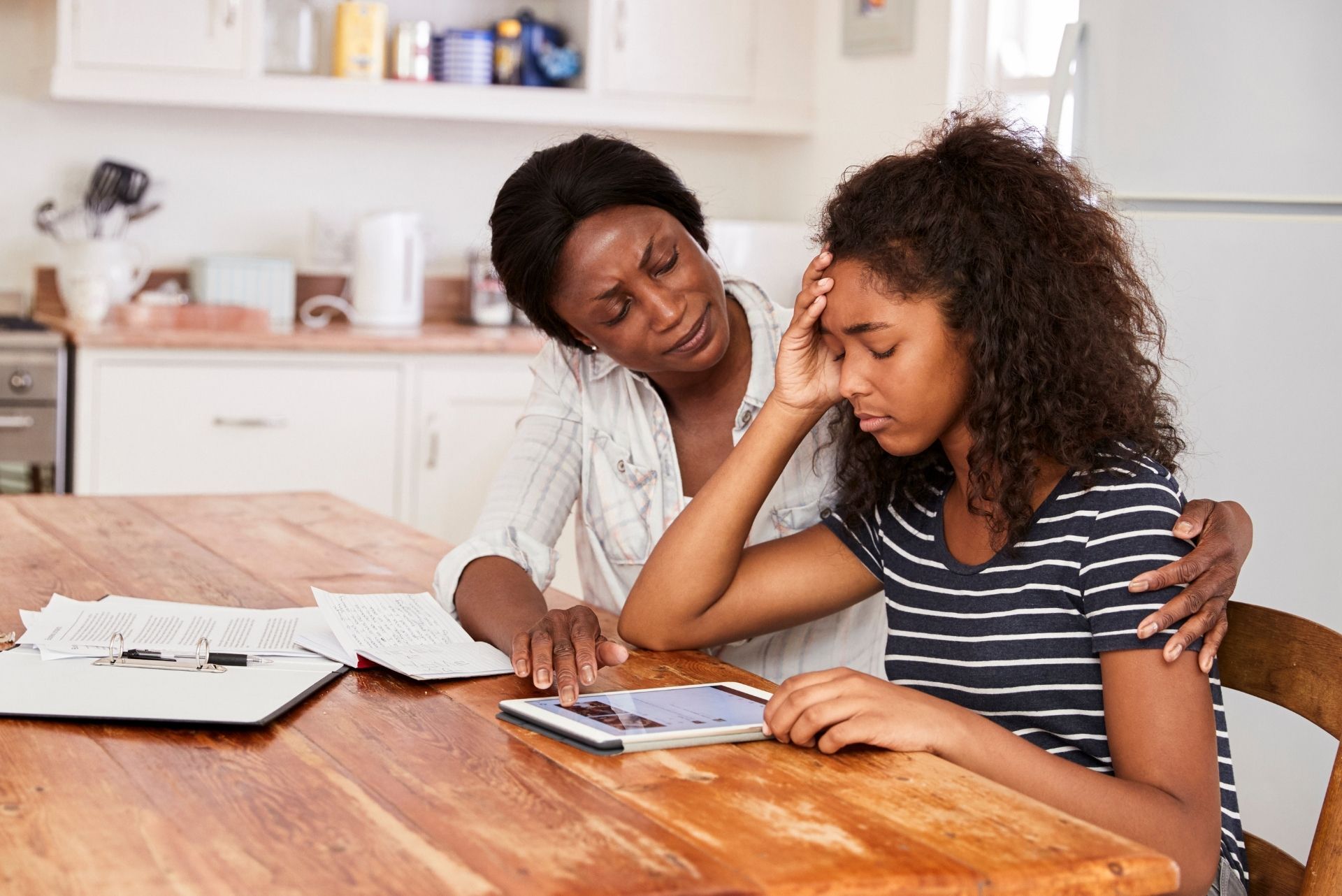
Life moves fast. Between work deadlines, school drop-offs, packed lunchboxes, and the constant ping of notifications, it can feel very overwhelming. Even from a young age, many people lie awake at night, replaying the day and wondering if they missed something or said the wrong thing. The fear of making mistakes can easily overshadow everything else. As adults, many learn ways to manage that anxiety, yet it still has a way of creeping back in—especially given the relentless pace of modern life. When that sense of overwhelm sets in, it’s often a sign that stress and anxiety have taken the reins. Learning to cope with anxiety in childhood is an important life skill that can be developed with time and practice.
Dear CPI,
My 11-year-old daughter is a kind, responsible kid who tries really hard in school and rarely has any major behavior issues. But lately, I’ve become worried about how anxious she is. She worries about everything, forgetting homework, being late, disappointing someone, or doing something wrong. She often gets so upset that she can’t think straight. I tell her everything will be fine, but that seems to make her more upset. I’m worried this will get worse as she gets older and faces more pressure. What should I do?
- Valerie
Dear Valerie,
You’re on the right track by taking your daughter’s emotions seriously. Anxiety is a natural reaction to anything the brain sees as a “threat,” including stress at home, school, with friends or in the community. Signs of anxiety can include a faster heartbeat and breathing, sweaty palms, tense muscles, light-headedness or an upset stomach. These physical reactions can make us more alert and prepared to do our best in situations like tests or sports. However, they can also be frightening for some children, especially if they experience frequent or intense anxiety. It can lead children to believe that something is wrong with them or something bad will happen. If left alone, these thoughts and feelings can become overwhelming and interfere with daily life. Here are some tips to help your family:
Acknowledge and empathize with your child’s feelings. When children become upset, their “emotional brains” take over, making it hard for them to see the situation and options clearly. Many parents try to reassure their children that everything will be fine, solve the problem or tell them the situation is not really a big problem. While the parents might be right, children are more likely to believe these words once their fears have been acknowledged as real to them. A simple statement such as, “I can see you’re really worried,” or, “I’ve felt that way before,” can have a calming effect.
Ask questions and listen. Try to find out whether something happened recently that caused her to become anxious or nervous. Then ask a few questions to encourage her to express her thoughts and feelings. Listen and continue to acknowledge her feelings, even if you don’t understand or agree with how she views the situation.
Guide your child through problem-solving steps. Help her define the problem or concern, then brainstorm possible ways to handle it. Encourage her to come up with ideas first before offering suggestions. Talk about the pros and cons of each idea, then help her decide which one to try. Have her practice what she’ll say or do to build her confidence in her ability to handle the situation. After she tries her solution, talk about how it worked and what she would do the next time something similar happens. Over time, this process will help your daughter learn ways to handle stress and anxiety before it becomes overwhelming.
Stay calm and patient. Helping children deal with anxiety can add more stress to a family. Use coping strategies yourself, like taking deep breaths, saying positive affirmations, or taking a break. It will help you stay calm and patient, while also modeling healthy coping strategies.
FINAL THOUGHTS: Stress and anxiety are unavoidable parts of everyday life, but they don’t have to take over our lives. Learning to cope with anxiety in childhood is an important life skill that can be developed with time and practice.
EN ESPANOL
La vida se mueve rápido. Entre las fechas límite del trabajo, dejar a los niños en la escuela, los almuerzos preparados y el constante sonido de las notificaciones, puede resultar muy abrumador. Incluso desde una edad temprana, muchas personas se quedan despiertas por la noche, repasando el día y preguntándose si se les escapó algo o si dijeron algo incorrecto. El miedo a cometer errores puede fácilmente opacar todo lo demás. De adultos, muchos aprenden formas de manejar esa ansiedad, pero aun así, esta suele regresar—especialmente ante el ritmo implacable de la vida moderna. Cuando aparece esa sensación de agobio, a menudo es una señal de que el estrés y la ansiedad han tomado el control. Aprender a lidiar con la ansiedad desde la infancia es una habilidad importante para la vida, que se puede desarrollar con el tiempo y la práctica.
Estimada CPI,
Mi hija de 11 años es una niña amable y responsable que se esfuerza mucho en la escuela y rara vez tiene problemas de conducta importantes. Pero últimamente, me he preocupado por lo ansiosa que está. Se preocupa por todo, por olvidar la tarea, por llegar tarde, por decepcionar a alguien o por hacer algo mal. A menudo se molesta tanto que no puede pensar con claridad. Le digo que todo estará bien, pero eso parece molestarla más. Me preocupa que esto empeore a medida que crezca y se enfrente a más presión. ¿Qué debo hacer?
- Valerie
Estimada Valerie,
Va por buen camino si se toma en serio las emociones de su hija. La ansiedad es una reacción natural a cualquier cosa que el cerebro vea como una "amenaza", incluyendo el estrés en el hogar, la escuela, con los amigos o en la comunidad. Las señales de ansiedad pueden incluir latidos cardíacos y respiración más rápidos, palmas sudorosas, músculos tensos, mareos o malestar estomacal. Estas reacciones físicas pueden hacer que estemos más alertos y preparados para dar lo mejor de nosotros mismos en situaciones como exámenes o deportes.
Sin embargo, también pueden ser aterradores para algunos niños, especialmente si experimentan ansiedad frecuente o intensa. Puede llevar a los niños a creer que algo está mal con ellos o que algo malo sucederá. Si no se trata con estos pensamientos y sentimientos, pueden volverse abrumadores e interferir con la vida diaria. Estos son algunos consejos para ayudar a su familia:
Reconozca y empatice con los sentimientos de su hija. Cuando los niños se molestan, sus "cerebros emocionales" toman el control, lo que les dificulta ver la situación y las opciones con claridad. Muchos padres tratan de tranquilizar a sus hijos diciéndoles que todo va a estar bien, resolver el problema o decirles que la situación no es realmente un gran problema. Aunque los padres pueden tener razón, es más probable que los niños crean estas palabras una vez que se ha reconocido que sus temores son reales para ellos. Una simple afirmación como "Veo que estás realmente preocupada" o "Ya me he sentido así antes" puede tener un efecto calmante.
Haga preguntas y escuche. Trate de averiguar si sucedió algo recientemente que la hizo sentir ansiosa o nerviosa. Luego haga algunas preguntas para animarla a expresar sus pensamientos y sentimientos. Escuche y siga reconociendo sus sentimientos, incluso si no entiende o no está de acuerdo con la forma en que ella ve la situación.
Guíe a su hija por los pasos de resolver problemas. Ayúdela a definir el problema o la preocupación, luego haga una lluvia de ideas sobre posibles formas de manejarlo. Anímela a proponer ideas primero antes de ofrecer sugerencias. Hable sobre los pros y los contras de cada idea, luego ayúdela a decidir cuál probar. Pídale que practique lo que dirá o hará para desarrollar su confianza en su capacidad para manejar la situación. Después de que pruebe su solución, hable sobre cómo funcionó y qué haría la próxima vez que suceda algo similar. Con el tiempo, este proceso ayudará a su hija a aprender formas de manejar el estrés y la ansiedad antes de que se vuelvan abrumadores.
Mantenga la calma y la paciencia. Ayudar a los niños a tratar con la ansiedad puede aumentar el estrés de la familia. Use estrategias de afrontamiento usted misma, como respirar profundamente, decir afirmaciones positivas o tomar un descanso. Esto le ayudará a mantener la calma y la paciencia, al mismo tiempo que modela estrategias de afrontamiento saludables.
REFLEXIONES FINALES: El estrés y la ansiedad son partes inevitables de la vida diaria, pero no tienen por qué apoderarse de nuestras vidas. Aprender a tratar con la ansiedad en la niñez es una habilidad importante para la vida que se puede desarrollar con el tiempo y la práctica.










